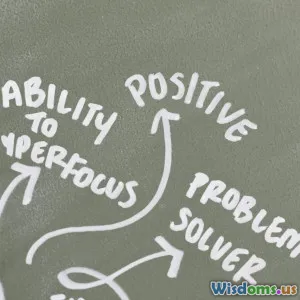
असमान समय में प्रतिरोधक क्षमता का निर्माण
(Building Resilience in Uncertain Times)
5 मिनट पढ़ें असामान्य वातावरण में स्थिरता विकसित करने और सफल होने के लिए रणनीतियों की खोज करें, अपनी सफलता और प्रेरणा को बढ़ावा दें। (0 समीक्षाएँ)
Building Resilience in Uncertain Times
In today's rapidly changing world, uncertainty has become a constant companion in both personal and professional spheres. Whether it's due to economic fluctuations, health crises, or social upheavals, the ability to navigate these unpredictable waters is essential for achieving success and maintaining motivation. Resilience, defined as the capacity to recover quickly from difficulties, plays a critical role in this process. In this article, we will explore practical strategies for building resilience, helping you thrive even in the most challenging situations.
Understanding Resilience
Before diving into strategies, it's important to understand what resilience truly means. Resilience is not merely about bouncing back; it's about growing stronger in the face of adversity. Psychologists emphasize that resilience involves a combination of mental, emotional, and behavioral flexibility. It enables individuals to adapt to stressors, mitigate the impact of challenges, and pursue their goals with renewed vigor.
The Importance of Resilience in Success
- Enhanced Problem-Solving Skills: Resilient individuals are better equipped to tackle problems head-on. They view challenges as अवसर rather than insurmountable obstacles.
- Sustained Motivation: When faced with setbacks, resilient people are more likely to maintain their motivation and continue working towards their goals, rather than giving up.
- Improved Emotional Regulation: Resilience helps individuals manage their emotions effectively, reducing anxiety and promoting a sense of control during uncertain times.
Strategies for Building Resilience
1. Cultivate a Growth Mindset
Adopting a growth mindset is foundational to resilience. This involves embracing challenges, persisting in the face of setbacks, and seeing effort as a path to mastery. According to psychologist Carol Dweck, individuals with a growth mindset are more likely to overcome difficulties and achieve their goals.
2. Foster Strong Connections
Building strong relationships with family, friends, and colleagues can provide a vital support system during tough times. Social connections not only provide emotional support but also offer different perspectives that can help in problem-solving.
3. Practice Self-Care
Prioritizing self-care is essential for maintaining resilience. Engage in activities that promote physical health, such as regular exercise, a balanced diet, and adequate sleep. Additionally, practices like mindfulness and meditation can enhance emotional well-being and reduce stress.
4. Set Realistic Goals
Setting achievable, realistic goals can help individuals maintain focus and motivation. Break larger goals into smaller, manageable tasks to create a sense of accomplishment along the way, which can boost confidence and resilience.
5. Embrace Flexibility
Being adaptable is a key component of resilience. Embrace changes and be open to adjusting your plans as necessary. Flexibility allows you to pivot in response to new information or changing circumstances, reducing the impact of unexpected challenges.
Learning from Setbacks
Resilient individuals view setbacks as learning experiences. Instead of dwelling on failures, they analyze what went wrong, identify lessons learned, and apply this knowledge moving forward. This reflective practice enhances problem-solving skills and prepares you for future challenges.
Conclusion
Building resilience in uncertain times is not just a survival tactic; it's a pathway to success and personal growth. By cultivating a growth mindset, fostering connections, practicing self-care, setting realistic goals, and embracing flexibility, you can strengthen your resilience and thrive amidst adversity. Remember, it's not the challenges we face that define us, but how we respond to them. Embrace resilience, and you'll find that success and motivation are well within your reach, no matter the circumstances.
पोस्ट को रेट करें
उपयोगकर्ता समीक्षाएँ
लोकप्रिय पोस्ट



















